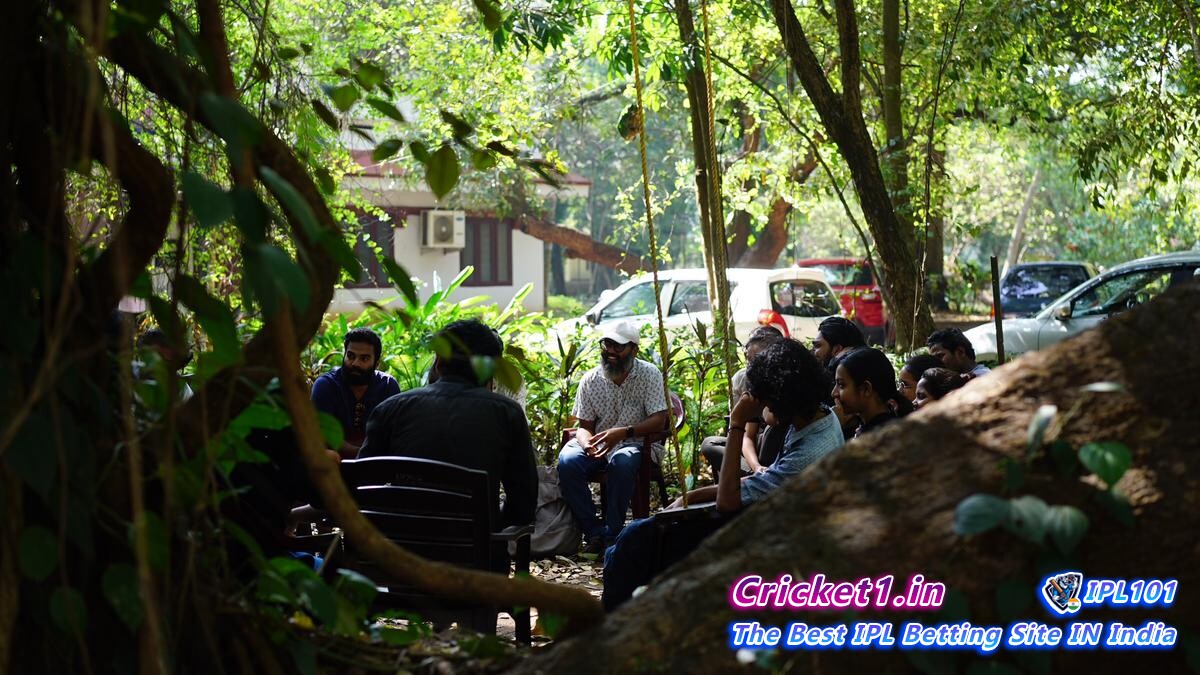
As dusk descended upon the wooded expanse of the School of Drama (SOD) campus in Thrissur, Kerala, a solitary figure could be seen weaving through the trees, his movement as fluid as the evening breeze. He whispered incantations to the fluttering leaves, rhythmically tapped his talking drum, serenading the forest birds with gentle melodies. This was Elikem Kunutsor, a performer whose presence almost dissolved into the surrounding nature, an embodiment of the very essence of the International Festival of Theatre Schools. Here, spectators were encouraged to move freely, an audible rustling accompanying their repositioning on the newspapers laid out beneath them, transforming the ground into a makeshift stage.
This year marked the festival’s second foray into an experiential realm where theatrical performance converges with ecological sensibility, fostering a creative melting pot where the arts and the environment resonate in unison. Within this dynamic intersection, participants, including theatre practitioners and students alike, delved into discussions and exercises bridging ecological consciousness with artistic expression.
The festival’s orchestrator, Abhilash Pillai, also helming the SOD, meditated on Malayalam theatre’s golden age, stretching from the 1940s to the 1980s, an era synonymous with social change and influential plays. In present times, however, the definition of what constitutes a ‘social’ play is being renegotiated, particularly in the wake of the global pandemic. Pillai reflected on existential queries: the extinction of ancient fauna and flora, the burgeoning threat of viruses, and the perilous notion that humanity could, at any given moment, fade into obscurity.
Within this backdrop of profound cogitation, performances and oral traditions spontaneously interlaced. The following day saw Elikem Kunutsor join forces unexpectedly with Maya Rao, a fellow artist and instructor, in a bout of silent storytelling through physical motion alone, their bodies engaging in an evocative dialogue within the Ramanujam Studio Theatre. Concurrently, participants immersed themselves in workshops focused on breath control, physicality in acting, and sustainable costume creation that paid homage to the environment.
Lectures from luminaries like writer and philosopher Sundar Sarukkai, Associate Professor Sara Matchett from the University of Cape Town, director Neelam Mansingh, and Professor Jane Collins from Wimbledon College of Arts, prompted new vistas of thought. A shift in perspective had been proposed, challenging the dichotomy traditionally held between nature and culture.
As participants absorbed these innovative paradigms, the festival journeyed through time, reviving the spectacle of traditional artforms. Thirayattam and Padayani, eschewing the conventional proscenium frame, unfolded in their natural, open-air habitats. Nights were aglow with fire-stick illuminations, as Padayani performers engaged in their ancient rituals.
An excursion to Kerala Kalamandalam during the cool pre-dawn hours revealed the daily regimen of young aspirants. Six-year-olds with drowsy eyes mastered percussive beats, striking wooden sticks against stone, a grounding in rhythm from a tender age. The site’s ecological sensitivity and traditional architectural grandeur resonated deeply with foreign visiting artists, as much as the time-honored art itself.
Among the interactive highlights was the unique ‘Winter Production camp’ activity, akin to a rendezvous with nature. Students, under the guidance of theatre professional Vishnupad Barve, conceived the Y Not App – a playful pairing of people with campus trees in a manner reminiscent of a dating app. The interaction was personal; for instance, one majestic banyan named Haal greeted participants with an endearing note: “It’s a connection we treasure.”
Timid at first, individuals gradually forged bonds with their selected trees, some finding themselves inevitably drawn to clamber and explore the living structures. This encounter offered a tactile communion with nature, both around and internal to the participants.
In essence, the International Festival of Theatre Schools has initiated an artistic symposium, embracing the integration of human experience with the natural world, fostering a stage where each leaf, breeze, and bird becomes an intrinsic player in the theatrics of life.

